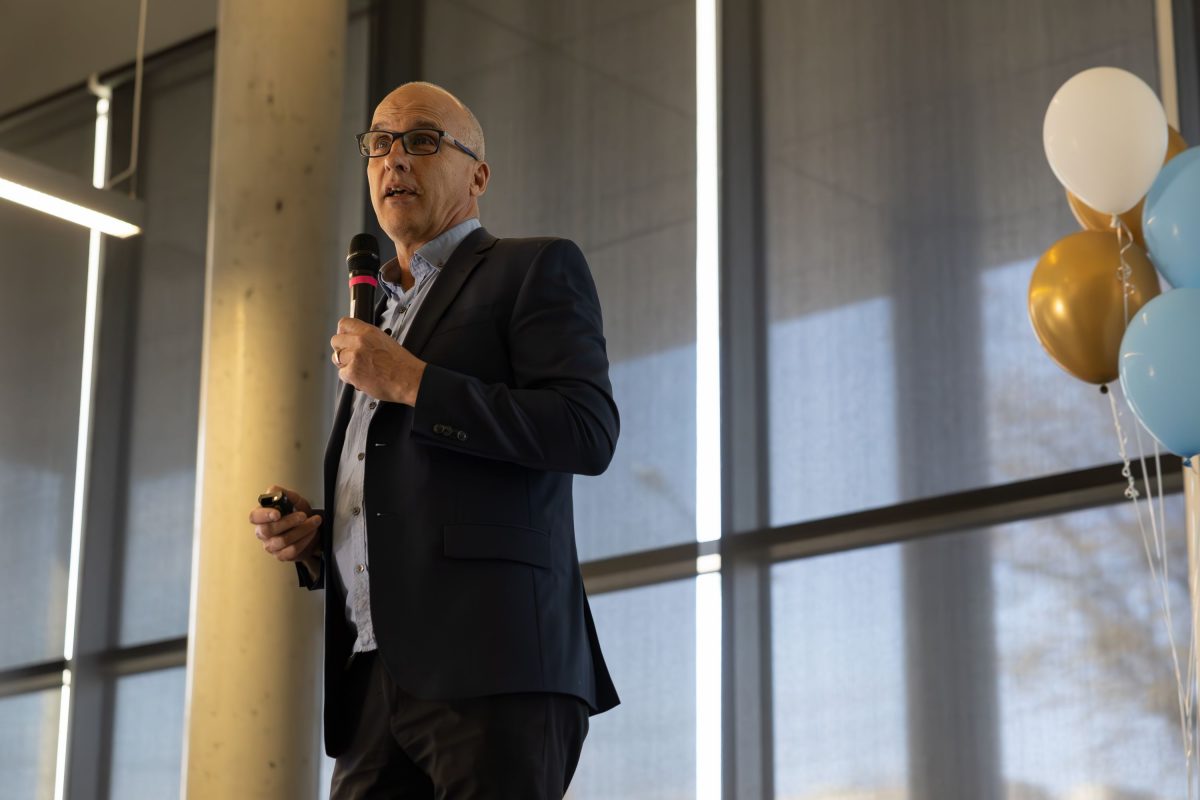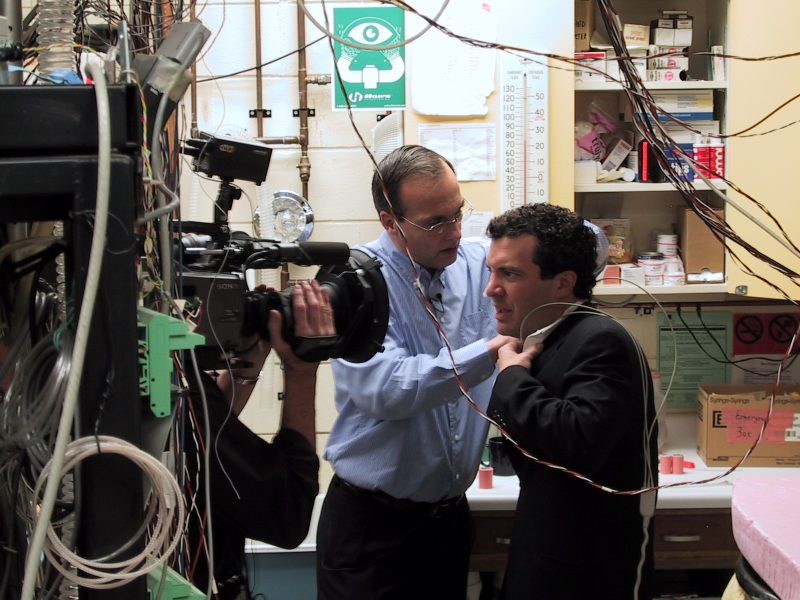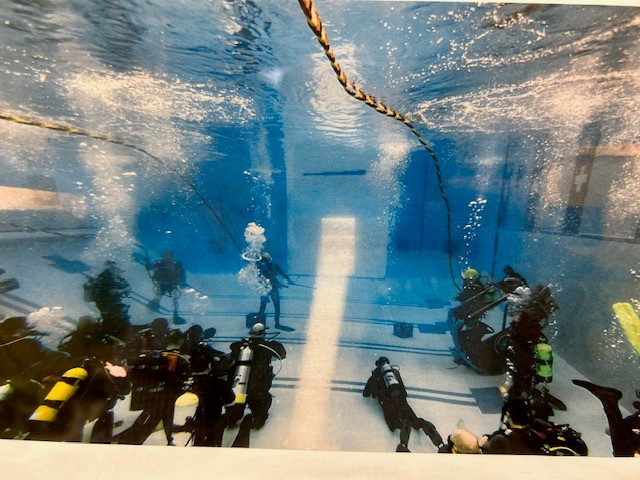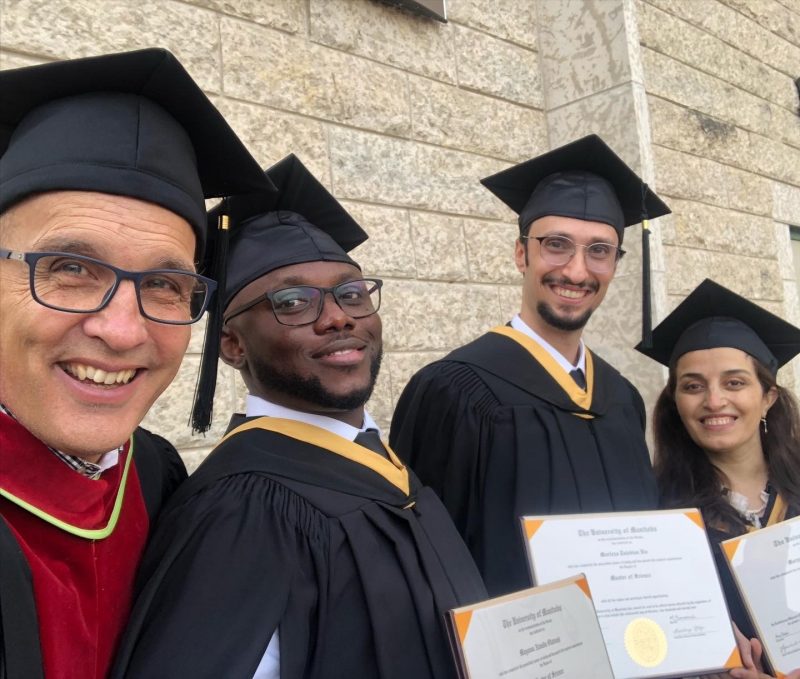
Dr. Gordon Giesbrecht retires after 32-years
A professor dealing with cold temperatures leaves behind a legacy of warmth as he retires
“We opened the lab three decades ago with the cutting of the ribbon,” said Gordon Giesbrecht during his retirement celebration. “How do you close a lab? You can’t uncut a ribbon?”
On December 5, 2023, Giesbrecht rang a ship bell inside his lab, officially closing the lab and signifying the end of his 32-year career as a professor with the Faculty of Kinesiology and Recreation Management.
Giesbrecht said the idea of the bell came from the Navy, which uses the bell to mark the endings of careers or ships. While it might’ve been out of place in some labs, the bell and the sound of a single ring was at home in Giesbrecht’s lab, home to a menagerie of equipment and memorabilia collected over his decades of study.
Giesbrecht operated the Laboratory for Exercise and Environmental Medicine, where he primarily studied human responses to exercises and work in extreme environments. Over the decades, Giesbrecht conducted hundreds of cold-water immersion studies, shaping the way first responders and the general public cold-stress situations.
Photos of past grad students hang on the walls alongside badges of different safety services he’s worked with. Below his photos and badges, a box of letters is tucked away in a corner. Many thanked Giesbrecht for saving the sender’s life.
One letter is from a Saskatchewan couple and their young son, thanking him for helping save their lives when their vehicle partially submerged. The couple said they managed to escape thanks to information they learned from an appearance of Giesbrecht on the Rick Mercer Report.

“I hadn’t gone through that binder in many years, but there it was,” said Giesbrecht. “It was very gratifying.”
Giesbrecht’s work and approach to his research (often involving himself as the test subject) made him a figurehead and expert for the media to call upon, including appearances on The Late Show with David Letterman and Mercer.
While being able to dunk Rick Mercer in his cold-water immersion tank and getting hot chocolate from Sarah Jessica Parker were career highlights, the opportunity to give six million people a lifesaving message was the goal.
“I started trying to make sure I directed the message,” said Giesbrecht. “We have an opportunity to make a difference.”
Giesbrecht even attributes coming up with the simple and easy-to-remember 10-1-10 principle, which helps describe the three phases of cold-water immersion, to the short time he’d have on The Late Show, wanting to deliver impactful information with the time he had.
The principle describes the one minute of cold shock you experience when suddenly entered into cold water, the ten minutes you have before incapacitation, and the one hour before hypothermia sets in.
Giesbrecht said he tries to deliver his knowledge in a way that captures an audience’s interest and holds it. Whether he’s in a different place, like beside Niagara Falls, outside the Palace of Westminster, or in a different element, like at the bottom of a pool in full SCUBA gear, Giesbrecht constantly tries to help an audience understand challenging but valuable topics.

“I think I’ve always been known for doing things differently,” said Giesbrecht. “Both because that’s exciting for me but also trying to think of different ways to teach and educate students.”
Giesbrecht’s final lesson to students is, “Don’t let your career be all about yourself.” Giesbrecht said he wanted to remind students about their privilege as university students at UM and always to remember to give back.
“The fact that you’re in this room means you have huge advantages over most people in the world,” said Giesbrecht. “I encourage you to make good use of the advantage.”
Giesbrecht said the other lesson he left behind for students was “Yes. How?”
“Many ideas die because as soon as it said somebody says, no, you can’t do that because of this, this and this,” said Giesbrecht. “You never even discussed whether it was a good idea.”
Giesbrecht said if something is a good idea and will do well, the work to get through the roadblocks to deliver a message is worth it. Giesbrecht’s “Yes. How?” mentality became a significant factor in developing the Active Living Centre, the 100,000-square-foot hub for campus health, wellness and physical activity. Giesbrecht was associate dean of special projects during the construction between 2012 and 2016, the only time the faculty has had the position.
“It was a significant accomplishment to get it done,” said Giesbrecht. “I was happy that it wasn’t just a matter of going to meetings.”
Faculty members like professor Cheryl Glazebrook remember Giesbrecht’s warmth to the community.
Glazebrook said on her first day, Giesbrecht, while he was acting associate dean of research, brought a screwdriver and right away helped put her nameplate on her door. A small gesture, but one, she said, that went a long way.
“That moment makes all the difference,” said Glazebrook.

Douglas Brown, dean of the faculty, said Giesbrecht will be remembered for the “energy, passion, and creativity that infused his teaching and research at the UM.”
“I also think of the commitment and tenacity he demonstrated in supporting the graduate students he supervised.”
On New Year’s Eve 2023, Giesbrecht will officially end his time with UM and FKRM. While his future will still be busy with academia and writing, he looks forward to spending time with his family and grandchildren.
“A couple of years ago we finished a project of scootering in all 19 Winnipeg skateboard parks,” he said. “Now we’re working on all the pools and libraries.”
Giesbrecht’s lesson of don’t let your career be all about Yourself will also guide him forward as he plans to continue to help bring knowledge across the globe. In July 2023, Giesbrecht visited Ukraine to deliver tourniquets, warming materials and his expertise in human hypothermia to men and women on the frontlines. Giesbrecht is already planning a return trip.
While Giesbrecht officially rang the bell earlier this month, closing out his career with UM and the FKRM, his legacy will continue to ring out for all the students, staff and faculty who got to work alongside Giesbrecht.






